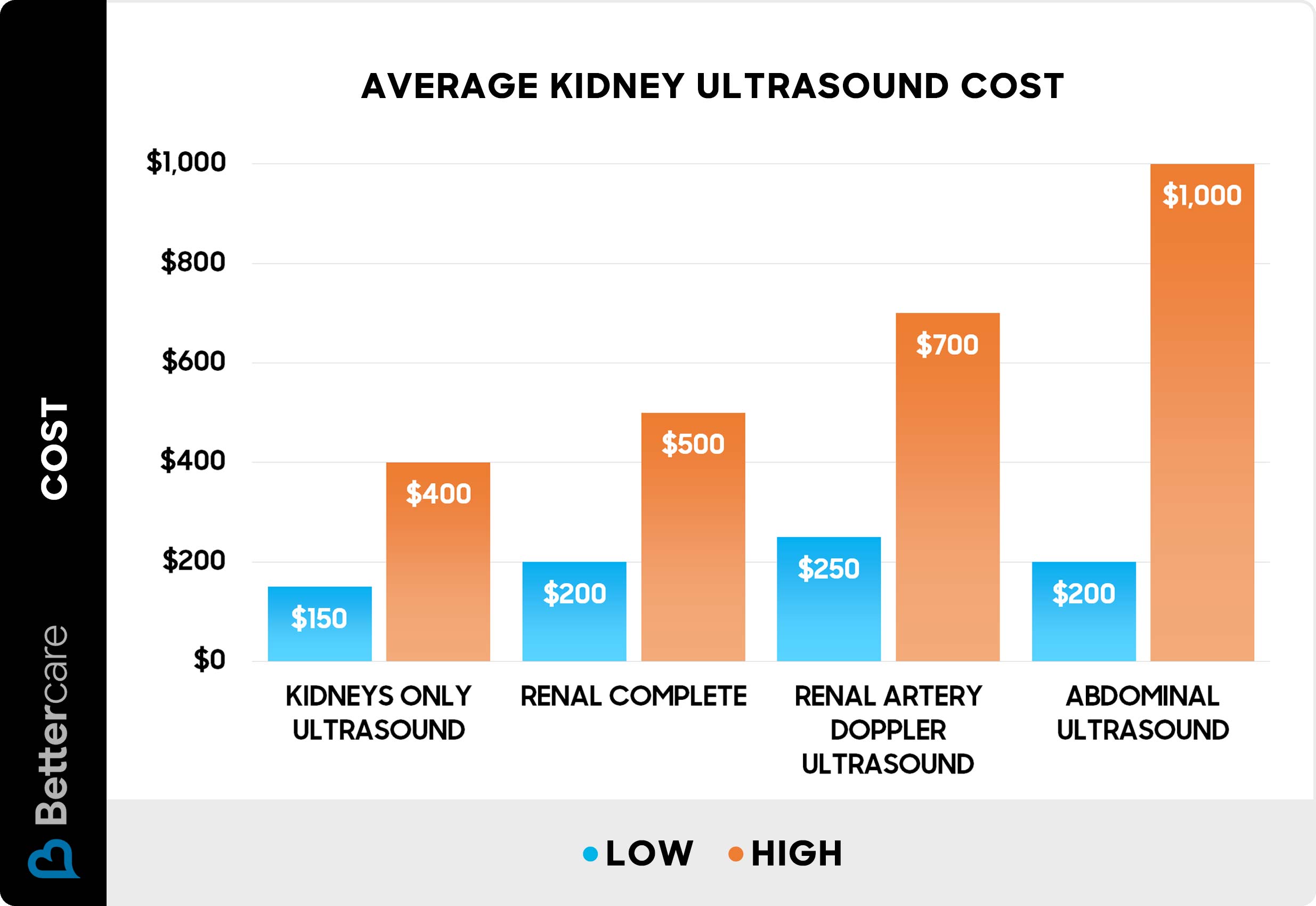
How much does a kidney ultrasound cost?
How much does a kidney ultrasound cost?
$150 – $500 average cost
Average kidney ultrasound cost
A kidney ultrasound costs $150 to $400 on average without insurance. This covers the cost of an ultrasound for kidney stones in most cases. A complete renal ultrasound costs $200 to $500 and includes the bladder

. More specialized Doppler renal artery ultrasound and broader scans of the entire abdomen have higher costs.
With insurance, the cost of a kidney ultrasound ranges from $0 to $50+ depending on your insurance plan, co-pay amount, and deductible.
| Procedure | Average cost without insurance |
|---|---|
| Kidneys only ultrasound | $150 – $400 |
| Renal complete (kidneys + bladder) | $200 – $500 |
| Renal artery Doppler ultrasound | $250 – $700 |
| Abdominal ultrasound | $200 – $1,000 |
*May be used to view kidneys
Kidneys only
The cost for a kidney-only ultrasound ranges from $150 to $400 for those without insurance. A provider orders this focused test when they want to look for cysts, masses, stones, or other abnormalities in the kidneys. As a targeted exam, it is often the least expensive renal ultrasound and does not include images of the bladder or arteries.
Renal complete (kidneys + bladder)
A renal complete ultrasound costs $200 to $500 without insurance. This study checks both the kidneys and the bladder, making it valuable for evaluating urinary tract issues, possible blockages, recurrent infections, or blood in the urine. The scan is more thorough than a kidney-only ultrasound and is preferred for patients with lower urinary tract symptoms.
Renal artery Doppler ultrasound
Renal artery Doppler ultrasound costs $250 to $700 for self-pay patients. This procedure uses Doppler technology to assess blood flow in the renal arteries and is used when hypertension or reduced kidney function may be caused by narrowed arteries. Of all the renal ultrasound options, this one is specialized for vascular diagnosis and can be more expensive than standard structure-based scans.
Abdominal ultrasound
An abdominal ultrasound costs $200 to $1,000 without insurance and is the most common type ordered for general abdominal symptoms or routine health evaluations. This scan covers multiple organs, including the kidneys, bladder, liver, pancreas, and spleen.
Providers select an abdominal ultrasound when a wider evaluation is needed because it gives more information about several nearby organs in one exam.
Renal ultrasound cost factors
Several important factors impact the final kidney ultrasound cost:
Facility type: Independent imaging centers commonly charge less than hospitals for the same kidney ultrasound procedure.
Number of kidneys scanned: A full renal ultrasound can cost more than a targeted or limited scan due to the increased imaging and interpretation.
Geographic location: Prices tend to be higher in major cities and regions with above-average healthcare costs.
Insurance coverage: Insurance could lower your out-of-pocket expenses, depending on your policy, medical necessity, and deductible requirements.
Radiologist / physician fees: In some cases, you may be billed separately for a radiologist to interpret your results.
Payment method: Paying cash in advance or comparing providers can sometimes yield lower rates or special discounts.
What is renal ultrasonography?
Renal ultrasonography, also called a renal (kidney) ultrasound or sonogram, is a non-invasive medical imaging procedure that uses high-frequency sound waves to create detailed images of the kidneys, ureters, and bladder. It helps doctors evaluate the size, shape, and position of the kidneys, as well as detect abnormalities such as cysts, tumors, stones, obstructions, or injuries. The test is painless, safe, and does not involve radiation exposure.
Why would a doctor order a kidney ultrasound?
Doctors may recommend a kidney ultrasound for several reasons:
To investigate causes of kidney pain, blood in the urine, or abnormal urine tests
To detect or monitor kidney stones, cysts, tumors, or other masses
To assess for signs of kidney infections, blockages, or injuries
To evaluate congenital kidney abnormalities or monitor chronic kidney disease progression
To guide certain procedures, such as needle biopsies or drainage of abscesses
What does a kidney ultrasound show?
A kidney ultrasound provides real-time images of:
The size, shape, and structure of the kidneys
The presence of cysts, tumors, stones, or other growths
Signs of swelling, obstruction, or injury
Blood flow to the kidneys (with Doppler ultrasound)
Abnormalities in the bladder or ureters connected to the kidneys
How is a renal ultrasound done?
During a renal ultrasound, you lie on your back or side. A technician applies a clear gel to your abdomen or lower back to help transmit sound waves. The technician moves a handheld device called a transducer over the skin, which sends and receives sound waves that are then converted into images displayed on a monitor. You are awake and comfortable during the entire procedure.
The test is painless, takes about 20 to 30 minutes, and allows you to return to normal activities immediately afterward. Your provider will let you know if you need a full bladder or any other preparation for the exam.

Kidney sonogram FAQs
Can ultrasound detect kidney failure?
An ultrasound can help identify signs associated with kidney failure, such as changes in kidney size or structure, but it cannot directly diagnose kidney failure. Blood and urine tests are needed for a definitive diagnosis.
Can ultrasound detect kidney stones?
Ultrasound is an effective imaging tool for detecting kidney stones, particularly those that are large or causing blockage. However, it may miss very small stones or stones located in the ureters. Ultrasound is commonly used when avoiding radiation is preferred, such as in pregnant patients.
How long does a kidney ultrasound take?
A kidney ultrasound takes about 20 to 30 minutes to complete. The duration may vary depending on the patient's anatomy and the specifics of the clinical situation.
Questions to ask your healthcare provider
Before your kidney ultrasound, ask your provider these important questions so you know what to expect:
What is the reason for ordering this kidney ultrasound?
What are we looking for or hoping to diagnose with this test?
How do I need to prepare for the ultrasound? Should I arrive with a full bladder, and do I need to avoid eating or drinking?
How long will the procedure take?
Who will perform the ultrasound, and will a radiologist review my images?
When and how will I get my results?
Will this test look at other organs or just my kidneys?
Are there any risks or potential discomfort with the procedure?
Can I get a copy of my ultrasound images and report?
Will this test check blood flow to the kidneys, such as with a Doppler ultrasound?